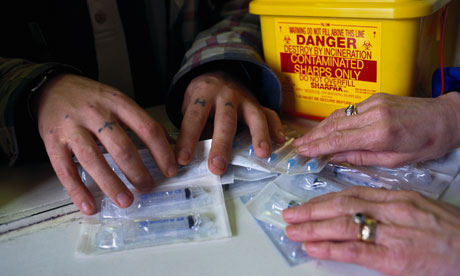
Last week at an international gathering of drugs and public health experts and activists, one of the speakers, Norman Fowler, former health secretary under Margaret Thatcher, reminded delegates of how, despite considerable opposition within her own party and beyond, Thatcher pushed through a national programme of needle exchanges for injecting drug users in an effort to stem surges in HIV infections.
This was politically brave at the time, but it was also one of the most significant steps ever taken by a UK government on drugs policy because it saved thousands of lives.
That it was courage on the part of a Tory government, which, alongside "safe sex" public health campaigns, embraced "harm reduction" as a pragmatic and effective way to intervene with drug users – thereby reducing the risk of HIV infection – might seem counterintuitive to many people. Yet as a direct result of that move (and of successive governments pursuing harm reduction strategies), the chances of injecting drug users in the UK being infected with HIV are among the lowest in the world.
Fast-forward 25 years, however, and drugs policy in the UK is once again facing challenges. This time much of the attention is directed at the issue of "decriminalisation" of drug use, due in part to high-profile individuals calling on government to reverse policies that result in large numbers of people – particularly from black and minority ethnic backgrounds – arrested and incarcerated for minor drugs offences.
However, there are other, less prominent, aspects to current drugs policy, and these pose potentially serious threats to public health. The first has echoes of the 1980s in that it affects mainly the gay community. There is rapidly emerging anecdotal evidence among a small but significant group of gay men of a trend towards injecting drugs such as crystal meth. Researchers and experts in the field are increasingly anxious that without a speedy and tailored harm reduction response, rates of not only HIV infection, but other potentially life-threatening sexually transmitted illnesses including hepititas C, will rise.
The second threat is the recent emphasis in the government strategy on abstinence. While it is promoted as something that should sit alongside harm reduction, there are many in the drugs and public health arena concerned that it represents an ideological agenda and that its promotion undermines established evidence-based interventions. And, finally, there is the impact of austerity policies. The shift of funding from primary care trusts to local authorities, and private contractors winning contracts from NHS providers, has created uncertainty in drugs services in some parts of the country. A survey by the UK Harm Reduction Alliance among users and providers in 2011 found that more than 75% had already witnessed cuts.
Right now we need the kind of bravery we saw from policymakers back in the 1980s. We need them to acknowledge the threats and deal with them head-on. This is not the time for undermining proven harm reduction approaches. And it is certainly not the time for destabilising or cutting services that are a lifeline to thousands of vulnerable people.

